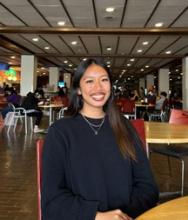As an aspiring counselor, Thea Deanon embarked on her internship search knowing that she wanted to gain experience in the field of mental health. She ultimately found a volunteer position at the Trevor Project as a crisis hotline counselor, providing comfort and assistance to queer youth in distress. This incredibly impactful experience strengthened her resolve to continue on this path in her career, further reinforced by her experience as a sociology and GWSS double major.
The Trevor Project is a non-profit organization that advocates for change through crisis services, advocacy, education, and public awareness. Most importantly, it aims to end suicide among LGBTQ+ young people. As a trained crisis hotline counselor, Thea staffed a 24/7 hotline which provides accessible options for LGBTQ+ youth to call, chat, or text whenever they need someone to talk to.
Finding the Right Internship
Thea found this opportunity through social media searches for volunteer counseling options. She began working with the Trevor Project during the summer prior to her GWSS fieldwork seminar because of the required 1-2 week training necessary to become a crisis hotline counselor. Her tip for future GWSS students seeking internships is to plan ahead to ensure there’s time to complete any training or onboarding before the start of the internship quarter.
Counseling is difficult. It can sometimes involve dealing with life-or-death situations, so finding the strength to take time for herself, and to really see the benefit in it all, was initially a challenge for Thea. “It was really hard for me not to take cases personally because I know a lot of them are hurting…it was a lot to take on, but I think there are some days where you think ‘Wow that was really helpful for someone,’ like ‘I saved a life.’” Thea expressed how work-life balance may have been hard at the beginning of her internship, but in the end, she found it rewarding to be able to help someone who was in a distressing situation. “You really do have to take some time to yourself and process your feelings instead of being avoidant because I think this is really challenging and uncomfortable work…”
Towards a Career in Counseling
Thea had already wanted to work in counseling before finding this internship, particularly within marriage counseling, but found this area of crisis counseling for youth to be incredibly helpful preparation for her future counseling plans. “I knew that I wanted to focus on gender and race…but adding more of the sexual orientation aspect was really useful in expanding what I can do to support individuals in counseling.” For Thea, this internship with the Trevor Project reaffirmed her passion for working with marginalized groups.
Thea originally was a sociology major and GWSS minor but eventually decided to major in GWSS as well. What she learned in GWSS courses helped her interrogate sociological models that don’t include attention to structural oppression from multiple vantage points. This critical perspective now guides her thinking about how to support members of marginalized groups whose experiences with various institutional forces have impacted their mental health. Thea found GWSS 374: Introduction to Transgender Studies with Dr. Amanda Swarr particularly helpful to her work in this internship. In this course, students worked beyond basic binaries, questioning normative assumptions associated with gender and sex and complicating them with sexuality, race, class, ability, history, and location. Thea explained, “The Trevor Project is working with LGBTQIA+ youths and a lot of the issues brought up in this course about bathrooms, schools, sports, and also just navigating life…did come up in my fieldwork.”
After graduation, Thea will continue her journey in youth and family counseling at Southwest Youth and Family Services in Seattle, where she secured a job during spring quarter of her senior year. Thea emphasized the importance of her work at the Trevor Project in shaping her career trajectory. Not only did the position teach her about setting limits and striving for work-life balance, but it also reaffirmed her interests and provided the experience and skills she wanted to prepare for a future career in counseling. “I think having an internship is really important just because you need that experience to get into a full-time job if you want one after you graduate,” Thea reflected. “I think a lot of the skills–like risk assessment, safety planning, and resource referrals–really helped me get my foot in the door in counseling.”
Story Credit: Eleanor Brecht, GWSS Communications Intern
